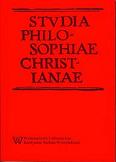Teleologia encykliki "Veritatis Splendor" św. Jana Pawła II w świetle "Summy Teologii" św. Tomasza z Akwinu (I−II, q. 18, a. 6)
Teleologia encykliki "Veritatis Splendor" św. Jana Pawła II w świetle "Summy Teologii" św. Tomasza z Akwinu (I−II, q. 18, a. 6)
Author(s): Michał MrozekSubject(s): Philosophy, Ethics / Practical Philosophy
Published by: Wydawnictwo Naukowe Uniwersytetu Kardynała Stefana Wyszyńskiego w Warszawie
Keywords: deontology; moral act; natural law; proportionalist ethics; sources of morality; teleological ethics
Summary/Abstract: This article presents the teaching of the Church in the encyclical letter "Veritats splendor" as standing against the erroneous opposition of deontological and teleological ethical considerations. The author recalls the background of cultural change at the time of the encyclical letter "Humanae vitae", written by the Blessed Pope Paul VI. The theological controversies contesting this magisterial teaching led Pope Saint John Paul II to compose the encyclical letter "Veritatis splendor". John Paul dismisses various doctrinal doubts arising from the proposals of proportionalist thinkers and sets out an unusually well elaborated and traditional concept of the sources of moral acts. He stresses the priority of the role of teleology in human agency and, in this way especially, reaffirms the role of the object of a moral act. The Pope highlights the necessity of two simultaneous aspects of goodness in a moral act: a vertical one of relation with the ultimate end, that is, God, and a horizontal one in relation to man, expressed in proper relationships of the object of a moral act to human goods. The papal analysis is complemented by a reference to Saint Thomas Aquinas, who presents in an analogical way the sources of human moral acts. Aquinas shows the distinction between the interior act of the will and its exterior act, i.e. the cooperation of the human will with other human powers. Aquinas shows the proper sources of morality of these two kinds of act: in the former, right intention is necessary, which identifies itself with the proper object of the will and its end. In the latter, one needs to consider also the proper object of the act, and thus the circumstances surrounding the act, in determining the act’s moral goodness. A proper anthropological foundation leads to a proper understanding of natural law, and the need for virtue ethics, which can lead mankind in a practical way to its own fulfillment. The basic truths of Magisterial teaching, presented here, are needed in the context of a dominant contemporary culture that systematically deconstructs any rational order and replaces it with a caricature. The Magisterial voice provides an important criterion of discernment between good and evil, guiding the faithful to the beauty of a moral life in Christ, giving them the possibility of sound moral judgment and steering them away from the most common errors and the growing crisis of identity that stems from them.
Journal: Studia Philosophiae Christianae
- Issue Year: 51/2015
- Issue No: 3
- Page Range: 39-66
- Page Count: 28
- Language: Polish

